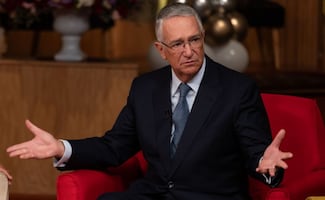Más Información

Descarrilamiento del Interoceánico: Cerré los ojos y sentí como se volteaba el tren, relata víctima; iba a exceso de velocidad, asegura

Arturo Ávila afirma que "Grandeza", libro de AMLO, le costó 100 pesos; entrega ejemplares a opositores

Arrestan al periodista Don Lemon tras manifestación antiinmigratoria; interrumpió un servicio religioso en Minnesota
Mexico's peso slumped to a three-month low on Wednesday, with the speed of its recent tumble sparking speculation the central bank could soon intervene to try and cushion the currency's fall.
The peso sank as much as 0.9 percent to 18.4510 per dollar, its weakest since February. The peso has lost nearly 7 percent this month, making it the second worst performer among the world's 36 most-traded currencies, behind the South African rand.
A prominent group of Mexican economists on Tuesday said the peso was under a speculative attack, and analysts said the country's central bank could soon sell dollars directly to the market, as it did in February.
"They are willing to use their firepower," said Alberto Ramos, an economist at Goldman Sachs in New York.
"You need to anchor the currency at some point, if the peso goes to 19 or 20 (to the dollar) that could change the inflation outlook and the central bank is very mindful of that," Ramos said.
By midday Wednesday, the peso had pared losses to trade 0.45 percent lower at 18.3625.
A sharp peso drop in February pushed Mexico's central bank to directly intervene in currency markets for the first time since 2009 and to unexpectedly raise interest rates after an unannounced meeting.
Then, Mexican policymakers said the peso was being targeted by electronic trading programs and that its losses did not match with the relatively sound position of the economy.
On Tuesday, Deputy Central Bank Governor Javier Guzmán said the bank may need to raise interest rates if global events hit the peso enough to affect inflation expectations. So far, inflation has been slower than expected.
Emerging market currencies have been slammed by renewed expectations the U.S. Federal Reserve could tighten borrowing costs, which could sap demand for higher-yielding but riskier assets.
The Mexican peso is one of world's most liquid currencies and unlike many other emerging markets there are no capital controls on its trade. That makes it easier to bet against the peso when global sentiment on risky assets turns sour.
"It's a cheap proxy for expressing a negative view on emerging markets," said UBS strategist Manik Narain.
Mexico's peso bonds are among the most widely held debt among those issued in emerging market currencies.
Foreign investors hold over 2 trillion pesos (US$109 billion) in peso debt, and many need to hedge their positions when the peso slumps, further driving volatility, Narain said.
Noticias según tus intereses
[Publicidad]
[Publicidad]











